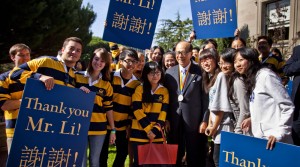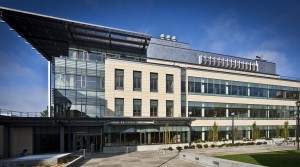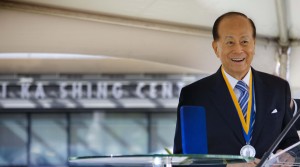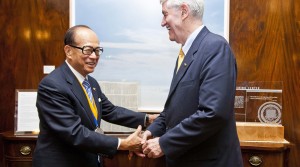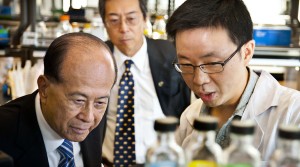(Berkeley, 21 October 2011) With the dedication today (Friday, 21 Oct) of the Li Ka Shing Center for Biomedical and Health Sciences, the University of California, Berkeley, enters a new era of biomedical research that promises to unlock the fundamental mystery of deadly diseases worldwide.
The new 200,000-square-foot facility will be the nexus for a wide variety of research across disciplines and across the campus that pursues ways to prevent the root causes of diseases such as cancer, Alzheimer’s, HIV and tuberculosis, rather than just treat the symptoms.
The center, prominently located at the west entrance of the campus, rises five stories above ground and includes one underground level. Inside, scientists from around the world will study and teach UC Berkeley students about the underlying mechanisms of biology and disease, addressing the complexities of cancer, brain diseases, infectious global killers and stem cell biology.
On hand to celebrate the event was international entrepreneur and philanthropist Li Ka-shing, lead donor to the center with a generous gift of USD40 million in 2005. UC Berkeley has named the building in honor of Mr Li in recognition of his generosity, which has helped to propel the campus’s pioneering research in biomedical and health sciences.
In 1980, Mr Li established the Li Ka Shing Foundation to nurture the culture of giving, to support education reform initiatives that create a paradigm shift to develop human capital for positive and sustainable change, and to support medical research and services in the quest for a healthier world.
At the event, Mr Li was presented with the Berkeley Medal, UC Berkeley’s highest honour, in recognition of his global philanthropy and long-standing commitment to the advancement of education and the health care sciences.
Speaking at the dedication ceremony, Mr Li quoted from Nobel physicist Richard Feynman’s “The Value of Science” lecture, saying that scientists’ responsibility is “to do what we can, learn what we can, improve the solutions and pass them on.”
Mr Li said, “Applied beyond the confines of scientific communities into broader society, this seemingly simple and specific duty would require each and every one to be more thoughtful and knowledgeable about the diversity of human conditions and sentiments. It also requires major resource commitments from society into providing high-quality education as a means of creating equality of opportunity and more fulfilling lives.”
“I believe investments in high-quality education are the best investments in improving the human condition. In this new biomedical center, you are all accomplished scientists dedicated to exploring the frontiers of knowledge, and I am sure that aside from Berkeley, you have a lot of offers to choose from. However you have chosen to conduct your groundbreaking research here in a public institution with far fewer resources and lots of challenges to surmount. I salute your commitment and your contribution to society, and I know that your discoveries will bring significant changes to our world and positive benefits for all mankind.”
The facility, the anchor for a quadrangle of research and teaching buildings dedicated to the biomedical and health sciences, will formally open for classes for undergraduates and graduate students in the upcoming spring semester. It will house more than 450 researchers and feature:
•Flexible, open labs shared by multiple investigators to facilitate collaboration;
•Highly specialised facilities to house state-of-the-art instrumentation and containment areas for handling viruses and stem-cell cultures;
•Teaching suites composed of laboratories, seminar rooms and a large lecture theater;
•Clusters of faculty offices and student interaction suites;
•The Henry H Wheeler Jr Brain Imaging Center, The Berkeley Stem Cell Center and The Henry Wheeler Center for Emerging and Neglected Diseases; and
•Sustainable environmental design features for energy efficiency.
“Two of the essential tools for improving the quality of human life and furthering the progress of society are health care and education,” said UC Berkeley Chancellor Robert J Birgeneau. “As we gaze upon the elegant silhouette of the center, we see a powerful expression of our shared commitment to a healthier and better future for all. Many thanks to Mr Li, whose generosity is fueling a world-class research center that will allow our faculty and students to reach across disciplines and borders to create a healthier world.”
Robert Tjian, founding faculty director of the center, said that UC Berkeley “is at the forefront of a new era of modern medicine. Knowledge of biology and how the human body works is reaching a level of sophistication that promises to change the whole paradigm of health care, enabling new generations of doctors, clinicians and researchers to treat and prevent the root — the molecular — causes of diseases rather than their symptoms. The center will greatly expand our capabilities, thereby accelerating biomedical developments that will transform our lives.”
Construction also was made possible through a strong public-private partnership, including support from the California Institute for Regenerative Medicine, the Wayne and Gladys Valley Foundation and the Ann and Gordon Getty Foundation.
Mr Li is chairman of Cheung Kong (Holdings) Limited and Hutchison Whampoa Limited, both based in Hong Kong. Before arriving in Berkeley for the dedication celebration, he received the Carnegie Medal of Philanthropy in New York yesterday and attended the opening of the Li Ka Shing Knowledge Institute at St Michael’s Hospital in the University of Toronto on Tuesday.

